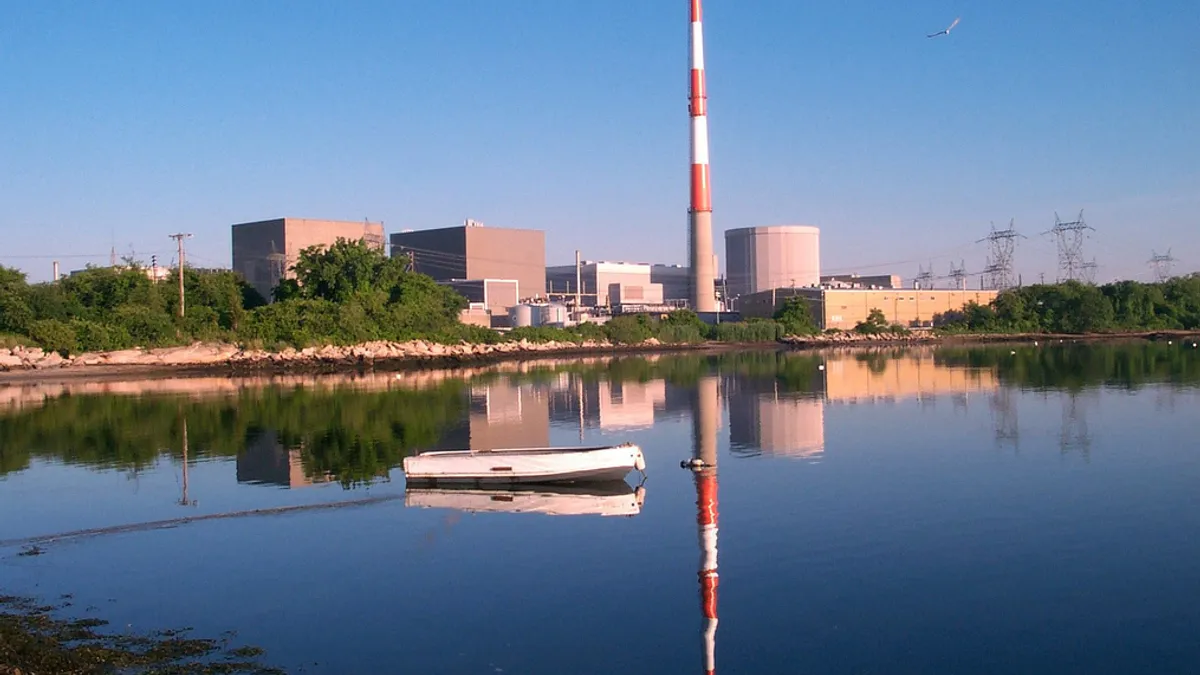Dive Brief:
- A draft decision issued last week by the Connecticut Public Utilities Regulatory Authority (PURA) could clear the way for Dominion Energy's Millstone nuclear plant to remain open, by allowing the facility to compete for power contracts in the state's carbon-free procurement process.
- The auction is run by the Department of Energy and Environmental Protection (DEEP) and results are expected by the end of the year — around the same time PURA could finalize its conclusion that Millstone is at risk of closing.
- DEEP received more than 100 bids in response to its zero emission request for proposals (RFP). Dominion officials told Utility Dive they submitted 16 bids that could provide more than $1 billion in total benefits to consumers.
Dive Insight:
Connecticut's determination that Millstone is "an existing resource at risk of retirement" would mean the plant's bids into the state power auction could compete as new, carbon-free resources like wind and solar. That would credit the facility for its emissions-free attributes as well as the price of its energy, which company officials say is necessary in order to continue operating.
"We need something that sustains us above what the current wholesale [price] market is, and customers need something below the retail," Kevin Hennessy, Dominion's director of federal, state and local affairs in New England, told Utility Dive.
Bids were due in September, Hennessy said — before the company would receive a determination about Millstone. As a result, "we put together some incredible bids," he said, ranging from three to 10-year bids over a range of MWh of generation.
Depending on the selection, Hennessy said Dominion's bids could save customers between $630 million and $1.23 billion.
PURA's draft decision came out Friday, and written exceptions are due Nov. 27, with a potential hearing on those exceptions Dec. 21. A final decision is due out by Jan. 2, but could come alongside the auction results, said Hennessy.
This would be the first time Connecticut allowed a nuclear plant to bid into the carbon-free auction, and is a contested topic in the region.
"[T]o treat nuclear power as it were a renewable resource is completely inappropriate," Joel Gordes, a local energy consultant, told the New Haven Register, citing the dangers of spent fuel.
But many don't want to see existing nuclear plants retire due to concerns about how the energy will be replaced, and whether it could come from dirtier energy sources. Other states have tackled the issue of uneconomic nuclear plants and, though the methods vary, solutions are becoming entrenched.
Illinois created a Zero Emission Credit (ZEC) for nuclear plants, and in September, a federal appeals court upheld the nuclear energy subsidies, ruling they do not interfere with the federal government's jurisdiction over interstate power markets. New York has a ZEC program that has also survived a court challenge.
"This is Connecticut doing its own thing," said Hennessy. "Its not a ZEC program, but the state is basically acknowledging the value of nuclear."















